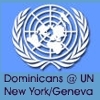

| BRIEFING - December 1 , 2010 | To learn more about the Millenium Development Goals click on the graphic
| ||
Observing a day of solidarity with the Palestinian people
In 1977, the General Assembly called for the annual observance of Nov. 29 as the International Day of Solidarity with the Palestinian People. On that day in 1947, the General Assembly adopted a resolution which would change the course of history in the Middle East and beyond. When the British ended their Palestine Mandate in 1947, they turned control over to the United Nations. The UN Partition Agreement of Nov. 29, 1947, divided Palestine into sectors: a Jewish state receiving 55 percent of the land, and a Palestinian Arab state, receiving 45 percent. Jerusalem was to be left under international control as a “separate body.” The result of this partition was the 1947-1948 war. In June 1948, the new state of Israel came into being. It comprised 78 percent of the land. The remaining 22 percent included the Gaza Strip, the West Bank, and Arab East Jerusalem. From 1948 through June 1967, Egypt controlled the Gaza Strip, while Jordan governed the West Bank and East Jerusalem. After the 1967 war, Israel took control of the West Bank, Gaza and East Jerusalem – the last 22 percent of historic Palestine. These areas are now identified as the “occupied territories.”* The Chair of the Committee on the Exercise of the Inalienable Rights of the Palestinian People, Abdou Salam Diallo (Senegal), captured the spirit of the day in these words addressed to the gathered assembly: “The question of Palestine weighs heavily on our collective consciousness as the great unfinished business of the 20th century. The Palestinians and the Israelis continue to pay the price for this failure.” Deputy Secretary-General Asha-Rose Migiro, speaking on behalf of Secretary General Ban Ki-moon, referred to two timelines which had reached a critical point in 2010: Palestinian president Mahmoud Abbas and Israeli Prime Minister Benjamin Netanyahu had pledged to seek a framework agreement on permanent status by September 2011; and, the Palestinian Authority was on track to complete its two-year agenda of readiness for statehood by August 2011. She noted, however, that few Palestinians were optimistic, since shortly after talks on final status had begun this past September, Israel’s settlement moratorium expired, ushering in the construction of new units throughout the West Bank, as well as new approvals for settlements in East Jerusalem. At the same time, Ms. Migiro noted that few Israelis seemed hopeful that peace could be achieved either, citing their security concerns. She went on to say that much more needed to be done on the part of the Palestinian Authority, in terms of developing its institutions of statehood, preventing terrorist attacks on the part of Palestinians, and curbing incitement among its population. Over and over again, however, the occupation and illegal settlement activity were cited as the core of the conflict. The confiscation of land, the expulsion of Palestinian citizens from their homes, the construction of the wall, the blockade imposed on the citizens of Gaza, and the illegal transfer of Israeli citizens into Occupied Palestinian Territory seem to be serious obstacles to peace. In his message marking this Day of Solidarity with the Palestinian People, the Secretary General said, “An overwhelming international consensus exists on the need to end the occupation that began in 1967, address the fundamental security concerns of both parties, find a solution to the refugee issue, and see Jerusalem emerge from negotiation as the capital of two States.” At the conclusion of the proceedings, the Chair noted the messages of solidarity with the Palestinian people which had been received at that point from heads of state, prime ministers and governments throughout the world. Included were many countries from Africa, the Middle East, South America, and Southeast Asia, as well as the European Union. It is noteworthy to mention that the United States was not among those expressing solidarity. One can only wonder why. Its legitimate security concerns notwithstanding, Israel has consistently ignored UN Resolutions as well as international law. Meanwhile, the United States has provided over $3 trillion for Israel’s economy, including $3 billion annually in military aid, and has exercised veto power in the General Assembly, the Security Council and other UN organs more than 48 times to safeguard Israel from international sanction. The U.S. position regarding the conflict between Israel and Palestine is troubling, indeed. It is hard to imagine how genuine peace can result from overwhelming might and a lack of transparency within the Security Council. At the end of the day, it is people who suffer – Israeli and Palestinian. The President of the General Assembly, Joseph Deiss (Switzerland), reminded us that the United Nations is “sadly aware that the resolution (of 1947) did not translate into a just and lasting solution… Violence, human suffering and mistrust have dominated Palestinian-Israeli relations for far too long. How shall we explain to the coming generations our inability – during 63 years – to end the dramatic situation inflicted to the peoples of the region?” *“Understanding the Palestinian-Israeli Conflict: A Primer.” Phyllis Bennis, Olive Branch Press
|
Dominican Leadership Conference
Building relationships and collaborating in the mission of preaching the Gospel
29000 West Eleven Mile Road
Farmington Hills MI 48336
248-536-3234 Contact: Executive Director
